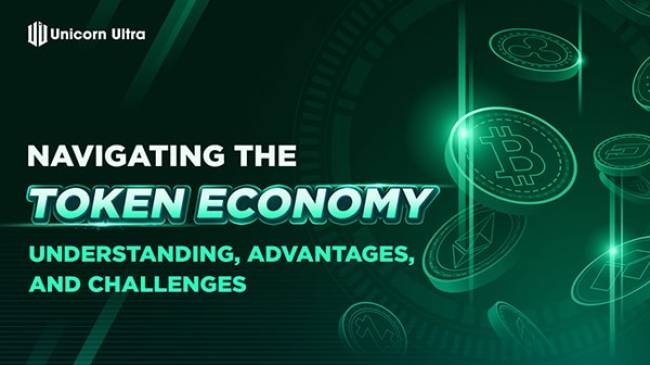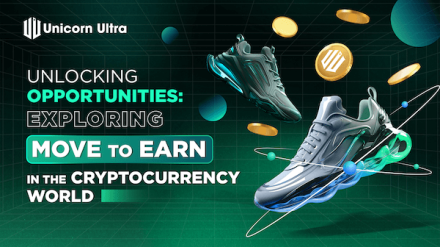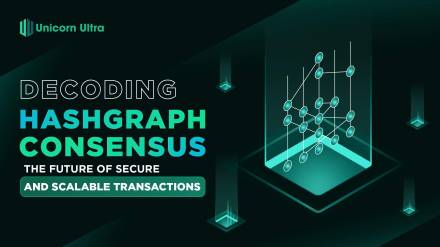In today's digital era, the emergence of blockchain technology has introduced novel ways of conducting transactions and managing assets. One concept that has garnered considerable attention is the Token Economy. This decentralized system has the potential to revolutionize various industries by providing a secure and efficient method of exchange. This article delves into what is Token Economy, its operational mechanisms, advantages, disadvantages, and the most suitable circumstances for its implementation.
Table of Contents
What is Token Economy?
What is Token Economy? A Token Economy refers to a system that employs tokens as a means of exchange within a network. These tokens are digital assets that are created, distributed, and managed through the utilization of blockchain technology. Each token represents a particular value or utility within the network and can be traded or utilized to access goods, services, or other resources.
The tokens within a Token Economy can be classified into two primary types: utility tokens and security tokens. Utility tokens are designed to grant access to a product or service, while security tokens represent ownership in an asset or company.

How does a Token Economy work?
Within a Token Economy, the entire transaction process is recorded and verified on a blockchain. This decentralized ledger ensures transparency, security, and immutability of the transactions. The process typically entails the following steps:
Token Creation: Tokens are generated and assigned a specific value or utility based on the network's purpose. This can be accomplished through events that generate tokens, initial coin offerings (ICOs), or other distribution methods.
Token Distribution: Once the tokens are created, they are disseminated among participants, investors, or users through various means. This may involve public sales, private sales, or airdrops.
Token Exchange: Participants within the Token Economy can engage in token trading through exchanges, peer-to-peer platforms, or direct transactions with other individuals. These exchanges facilitate liquidity and enable users to convert tokens into other cryptocurrencies or traditional fiat currencies.
Token Utilization: Tokens can be employed to access goods, services, or resources within the network. They can serve as a form of payment, confer voting rights, or provide access to exclusive features or content.
.jpg)
Advantages of a Token Economy
The Token Economy offers several advantages over traditional systems:
Enhanced Efficiency: By leveraging blockchain technology, transactions within a Token Economy can be executed faster and at a lower cost compared to traditional financial systems. The elimination of intermediaries and the automation of processes contribute to improved efficiency.
Heightened Security: The decentralized nature of blockchain ensures robust security by eliminating single points of failure and reducing the risk of fraud or tampering. The utilization of cryptography and consensus mechanisms further strengthens transaction security.
Global Accessibility: Token Economy transcends geographical boundaries, enabling participants from around the world to engage in transactions without the need for intermediaries or currency conversions. This fosters inclusivity and promotes financial inclusion.
Liquidity: Tokens can be easily traded on various exchanges, providing liquidity to token holders. This liquidity enables users to convert tokens into other assets or currencies as needed, thereby increasing flexibility and usability.
Disadvantages of Token Economy
Despite its potential, the Token Economy also presents certain challenges:
Regulatory Uncertainty: The regulatory landscape concerning cryptocurrencies and token offerings is still evolving in many jurisdictions. Unclear regulations and inconsistent policies may create compliance challenges for businesses operating within Token Economies.
Volatility: The value of tokens within a Token Economy can be highly volatile, subject to market speculation and external factors. This volatility can create uncertainty for investors and users and impact the overall stability of the system.
Scalability: As the popularity of Token Economies grows, scalability becomes a significant concern. The existing blockchain infrastructure may encounter difficulties in processing a large number of transactions, leading to potential bottlenecks and slower transaction speeds.

What are the applications of Token Economy?
Token economies, often associated with blockchain and cryptocurrency technologies, have a wide range of applications across various industries and use cases. These token economies leverage blockchain's features, such as security, transparency, and programmability, to create new systems of value exchange. Here are some notable applications of token economies:
-
Cryptocurrencies: The most well-known application of token economies is cryptocurrencies themselves, like Bitcoin (BTC) and Ethereum (ETH). These digital currencies enable peer-to-peer transactions, store of value, and cross-border payments.
-
Smart Contracts: Tokens can be used to execute smart contracts automatically when predefined conditions are met. This application is prominent on the Ethereum blockchain, where tokens like Ether are used to pay for gas fees to run smart contracts.
-
Decentralized Finance (DeFi): DeFi platforms use tokens to create open and decentralized financial systems. Users can lend, borrow, trade, and earn interest on their assets through various DeFi protocols and tokens.
-
Non-Fungible Tokens (NFTs): NFTs are unique digital assets often represented as tokens. They are used for ownership and provenance tracking of digital and physical assets, including art, collectibles, and virtual real estate.
-
Tokenization of Assets: Real-world assets like real estate, stocks, and commodities can be represented as tokens on a blockchain, making them more divisible, tradable, and accessible to a global audience.
-
Gaming and Virtual Worlds: Tokens are used in gaming ecosystems to represent in-game assets, characters, and virtual currencies. Blockchain-based games and virtual worlds like Decentraland and Axie Infinity use tokens for ownership and in-game transactions.
-
Supply Chain Management: Tokens are utilized to track and verify the authenticity and provenance of physical goods in supply chains. This enhances transparency and reduces fraud.
-
Voting and Governance: Some projects and organizations issue tokens to participants, allowing them to vote on project proposals, protocol upgrades, and governance decisions. This application promotes decentralization and community involvement.
-
Tokenized Securities: Traditional financial assets, such as stocks and bonds, can be represented as security tokens. This allows for easier trading and increased liquidity while complying with regulatory requirements.
-
Content Creation and Social Networks: Social media platforms and content creation networks are experimenting with token-based incentives to reward content creators and encourage user engagement.
-
Cross-Border Payments and Remittances: Cryptocurrency tokens enable faster and cheaper cross-border transactions, making them a viable alternative to traditional remittance services.
-
Identity and Digital IDs: Tokens can be used for identity verification and management, giving individuals more control over their personal information.
-
Energy and Carbon Credits: Token economies are being explored to facilitate the trading of renewable energy credits and carbon offsets, promoting sustainability.
-
Healthcare: Health-related tokens can be used to manage patient records, enable secure sharing of medical data, and incentivize healthy behaviors through rewards.
-
Education and Certification: Tokens can be used to verify educational credentials and facilitate lifelong learning by rewarding users for acquiring new skills.
-
Charitable Donations: Tokens can be used to transparently track charitable donations and ensure they are used for their intended purposes.
These are just a few examples of the many applications of token economies. The versatility of blockchain technology and tokens allows for creative solutions across a wide range of industries and use cases, and the field continues to evolve as new ideas and innovations emerge.
When to Use Token Economy
Token Economy can be advantageous in various scenarios, including:
Decentralized Applications (DApps): Token Economy is frequently employed in DApps, where tokens provide utility or access to the application's features. These tokens incentivize user participation and contribute to the growth of the ecosystem.
Crowdfunding and Fundraising: Token Economy enables innovative crowdfunding models, such as ICOs, allowing projects to raise funds by selling tokens to investors. This provides a new avenue for startups and entrepreneurs to access capital.
Loyalty Programs: Businesses can implement Token Economy to create loyalty programs, where customers earn tokens for their engagement or purchases. These tokens can be redeemed for discounts, exclusive offers, or even used as a form of currency within the business ecosystem.
Conclusion
The Token Economy represents a paradigm shift in the management of transactions and assets. With its decentralized nature, enhanced security, and efficiency, the Token Economy has the potential to disrupt various industries. However, challenges related to regulation, volatility, and scalability must be addressed to fully harness its benefits. A comprehensive understanding of what is Token Economy, the advantages, disadvantages, and appropriate use cases of the Token Economy is crucial for organizations and individuals seeking to leverage this innovative system in the digital era. Let's go with U2U to follow the latest information on the market.






